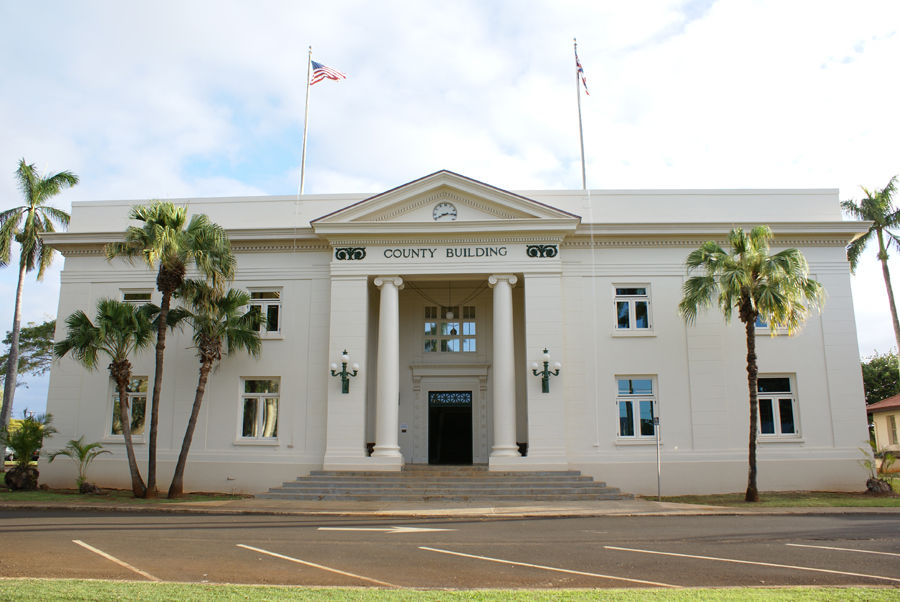LIHUE — The Kauai County Council on Wednesday gave its stamp of approval to new collective bargaining agreements that will raise public employee wages and other benefits by more than $1.3 million in the coming fiscal year, forcing the county
LIHUE — The Kauai County Council on Wednesday gave its stamp of approval to new collective bargaining agreements that will raise public employee wages and other benefits by more than $1.3 million in the coming fiscal year, forcing the county to again dip into its reserve savings.
Mayor Bernhard Carvalho, Jr. already joined with the state and other counties to give his approval to the agreements.
Several councilmembers expressed frustration over their lack of involvement in the negotiating process, and blamed the union agreements as one reason the county has not been able to achieve a sustainable, balanced budget, but the council ultimately approved the agreements by a unanimous vote.
Council Chair Mel Rapozo said councilmembers were between a rock and a hard place: “We can vote no and stop the funding, but then we’ll get sued.”
“We do a horrible job … negotiating these contracts. Horrible,” Rapozo said. “We let Honolulu negotiate for us. And that’s the problem. Honolulu has their own agenda.”
Although anticipated, the expense was not included in the fiscal year 2016 budget that was recently approved by the County Council and signed by the mayor. As a result, the council will have to approve a separate money bill to cover the cost, which will mean dipping into the unassigned reserve savings fund.
The 2016 fiscal year begins July 1.
Rapozo said that union agreements would eventually force the county to cut positions because it can’t afford to pay the increase, and urged the unions to start looking ahead.
“You can come up with the huge increases, but we’ll come to a point where we don’t have the money and we’re almost there,” Rapozo said.
Councilmember JoAnn Yukimura said that it is to union members’ benefit to work with the county, reminding them that unions did not fare well in Detroit’s bankruptcy.
“We may have to say no to pay raises in the future if we want a sustainable budget,” Yukimura said.
Councilmember KipuKai Kuali’i took issue with the idea that the county council doesn’t have a say in the matter: “Of course we have a say. This is the only place where we have a say.”
Kuali’i said the council didn’t do enough to eliminate vacant positions and reduce expenses in the last budget vote, and he said the council needed to take a closer look at county employee salaries.
“Let’s be real about the level of salaries throughout the county that we allow to just blow up as if this is the city of San Francisco or New York City,” Kuali’i said.
Councilmember Gary Hooser also disagreed with the idea that the council’s hands are tied, saying that councilmembers could choose to cut jobs if it determined that was the correct decision and if it had the political will.
“For the record, we are not powerless,” Hooser said.
The new union agreements covers bargaining units 2, 3, and 4.
Looking ahead to the 2017 fiscal year, the county anticipates a larger $8 million budget hole due to collective bargaining agreements that will again raise wages and benefits for public employee unions.
Budget Chair Arryl Kaneshiro pledged to closely watch the process in the future: “I know I will be paying a lot more attention to the collective bargaining process.”
Employee salaries and benefits are the largest portion of the county’s operating budget, and collective bargaining agreements are the biggest obstacle standing in the way of the mayor’s goal of building the county’s unassigned reserve fund to a level that is large enough to last two months, which would help the county achieve higher credit ratings. Higher credit ratings would help the county save money by lowering interest rates on borrowed funds.
In 2014, the county’s credit rating was downgraded from AA to AA- by Fitch Ratings, and Standard and Poor’s revised the financial outlook from stable to negative. The downgrades were attributed in part to the county’s continued use of the reserve fund to balance the annual budget. The county’s debt service, which includes principle payments and interest, currently costs $9 million a year.
Rapozo summed up his position. “At the end of the day, the governor and the mayors agreed to it, so now we got to fund it.”


